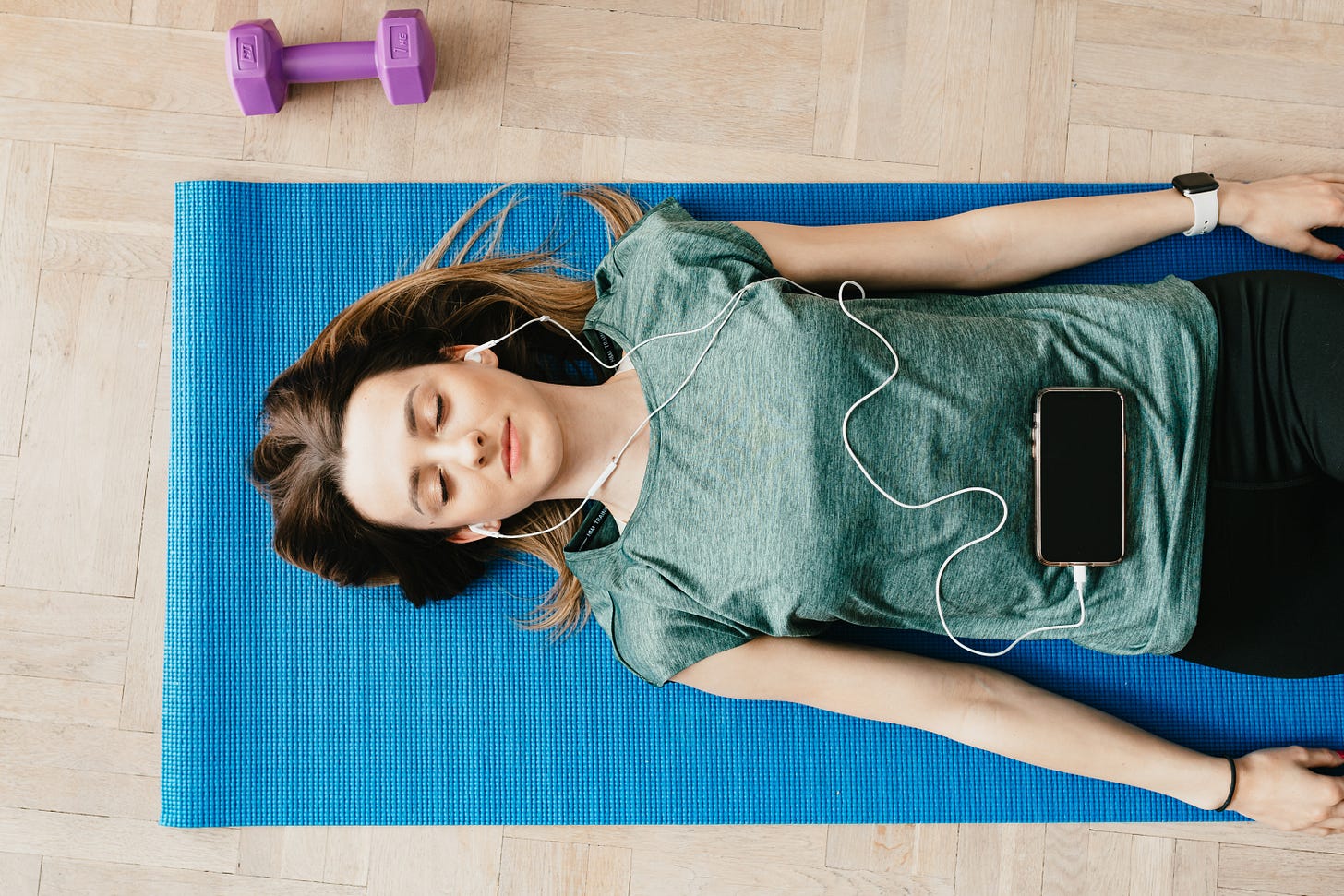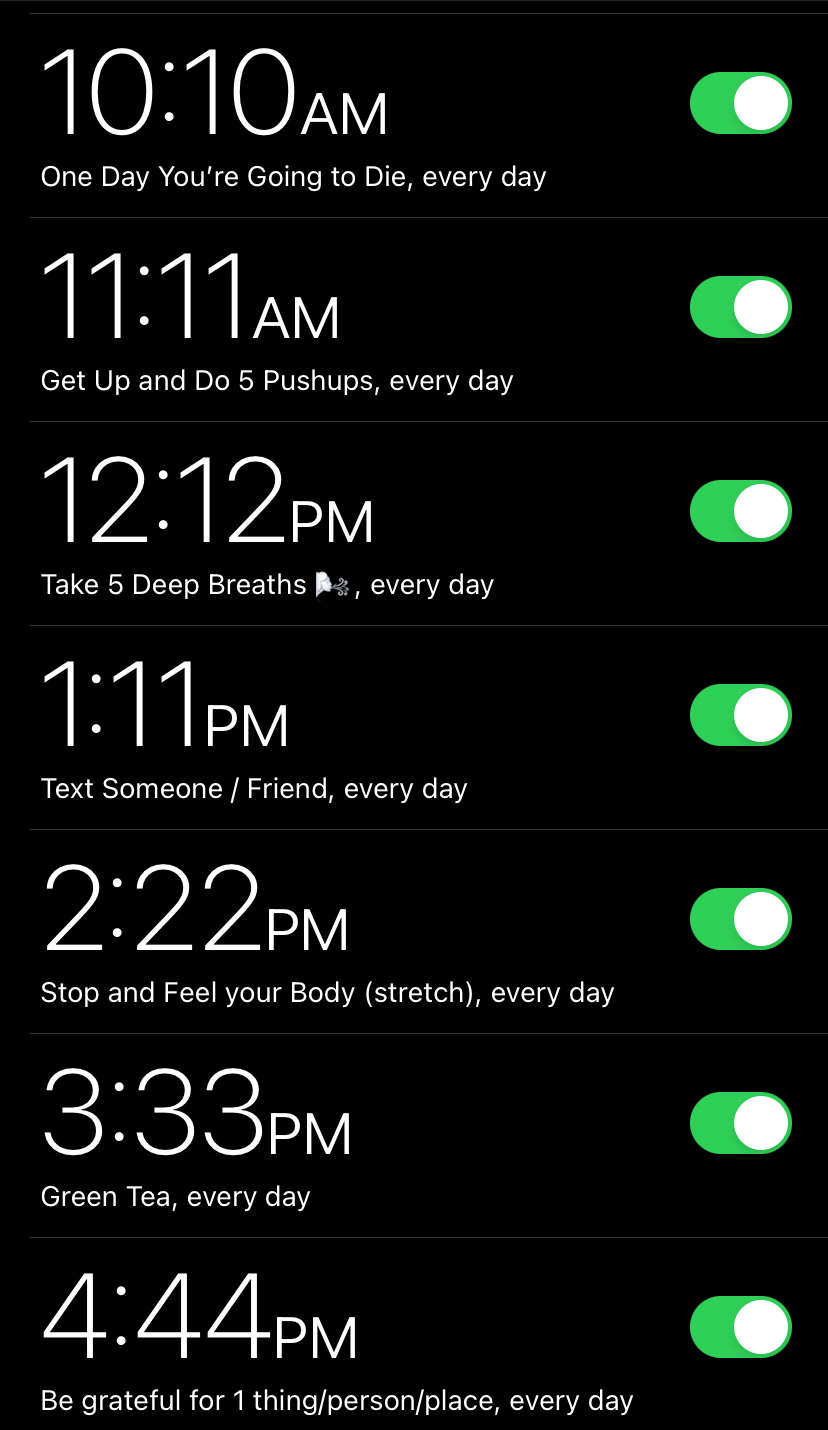How to Turn Your Phone Into a Mental Health Tool
Technology has been deemed bad, but is that actually true?
This Newsletter is free for everyone. I send this email to you weekly. If you would also like to receive it, join the 10,000 other learners today.
Social media is destroying the universe.
Our iPhones are why we are sick and tired.
Facebook is actively controlling people’s minds.
🤔 hmmm….
PS. I am running a workshop today, on how to be less shy, more confident and less anxious! Check it out here.
Maybe there’s some truth in those statements, but do any of these latest news article headlines touting how your phone is destroying you actually help your life or get you to change your behaviors?
Probably not. You’re still on social media. You’re still scrolling.
You still feel like you’re in this endless feedback loop from hell digitally on your phone.
Or, you’re able to quit social media for a certain time, and then you get back on it. Or, you give up your phone but all of a sudden find yourself watching, even more, Netflix and playing video games, really watching even more screens.
Before we get started, each person reading this has their own conceptions of how social media and technology impact our mental health.
It’s probably based on your experience, a documentary you watched, and the latest article’s headline claiming how the world is ultimately a worse place because of social media.
In this article, I will only be explaining the individual perspective on mental health. What you can control as a consumer, not fairytale ideals on how we wish the world operated.
I don’t know about you but I don’t plan to become a hermit and move to the mountains, and never use my phone again anytime soon.
Let’s find realistic options!
Here are 5 ways to begin to control your relationship with your phone and actually use it to impact your life for the better.
1. Teach Yourself to Do One Thing at a Time
Because if you don’t, your phone will mold your brain to not be able to do one thing at a time, without getting stressed.
Your brain is a highly complex meta-computer. If you have all these tabs, programs, and applications open on your laptop. You may realize it’s gotten slower, or the heat fan kicks on showing struggles of keeping up. Whether you think so or not…
Our minds operate similarly.
Our brains can only focus on one task, but we live in a world of constant multi-tasks.
Your boss asks you to send this…
You have to go do this thing…
You just remembered you gotta send that email…
You get a thought you should post that quote on Instagram…
All of these never-ending tasks, interfacing with the feedback loop between your brain, your phone, and the world, create a deadly combo of confusion & exhaustion.
The more you multi-task, the more you feel like you aren’t doing anything meaningful, despite the objective productivity measure.
So, then, you multi-task again, again, and again.
Next thing you know you have lost your free will because your attention muscle is focusing on random things that various algorithms have been serving you up on an hourly by hourly basis for the past several years.
Not doing one thing at a time, teaches your brain to not focus on one thing at a time.
Next thing you know, you’re at dinner with your family and you just realize you’ve had your phone out for the last 5 minutes, ignoring everyone, and stepping into your own bubble.
Now, your family thinks you are not interested in them, you have a lot going on, and are too busy for them.
So, now, your phone and how you have been interacting with your phone are impacting your attention muscle, close relationships, and life.
For what?
For more social media followers?
For not feeling like you’re bored for 5 seconds?
For being more productive and growing your business?
Realize that if you are not doing purposeful or fulfilling work in your life, your brain will constantly crave something better that could exist on your phone. A cellphone with an internet connection is our imagination’s best toy.
2. The Cost of Your Phone Isn’t Free
Do you remember when we only had access to a limited amount of minutes or texts?
I actually wish they could bring that back. Why?
I hate to break it to you, but that…
the email you responded to
social media post you created
3 seconds you spent rewatching your Instagram story
Is actually costing you.
It might not be costing you money.
But, unfortunately, a currency that’s way more expensive than cash.
It’s costing you time, energy, and your mind itself.
I’m not writing this to scare you or get you to freak out even more.
I’m writing this to bring you aware of the fact that everything we do in life has a cost. We often see the goals or the successes, but don’t think about what it took to get there…
Personally for me, in my own life… (while not always)
I choose to sleep for 8 hours > Stay up all night doing God knows what.
I choose to eat healthy daily > feeling mouth pleasure for 5 seconds from junk.
I choose to exercise in the morning > sleeping in and feeling cozy.
I choose to invest my time wisely > wasting it, trying to pass time with vices.
Choose what you want, and then choose what it will cost.
Some people will say this is a pessimistic viewpoint because you shouldn’t “sacrifice” anything in your life and you can “have it all.”
I say those people are unaware and haven’t understood life’s currencies. I also believe you should aim for whatever you want but keep in mind. Everything you choose to do or not do will impact your time, money, and energy.
Figure out, why you are using your phone exactly.
Now, get clear on the cost you are willing to pay to get that goal. If you’re not willing to pay anything, maybe you should reanalyze how you are using your phone.
Social media and the internet have completely changed my life. I consciously paid a cost, and am willing to continue to sacrifice to reach results, but aware of my mind’s health.
Don’t overpay!
3. Install Mind <> Phone Daily Reminders
We have our phones with us 24/7.
In our pockets, hands, in front of us on the table, next to us when we sleep, really everywhere. Just like our brains!
Why not create a positive feedback loop?
Below is a screenshot of my phone’s alarm system:
In 2019, I set one reminder, to read “One Day You’re Going to Die! Make it worth living!” as a cognitive reminder to go for it today.
Why hide, or be afraid of going for it, if I know I’m going to die one day?
I then used this same idea to program my day with reminders that fire at the same time daily. I use the same numbers, to create anchors in my mind.
Why do this?
Believe it or not, your brain already has pre-built reminders.
Instead of “Get up and do 5 pushups” it’s usually something like “think about this thing, and create stress for yourself” or “go to the fridge and overeat that food that probably isn’t the best for you.”
You gotta fight harder than your demons are fighting.
Or, snuggle with your demons, not struggle with your demons.
Why not use technology to help you?
4. Disable All Notifications, and Leave Your Phone Alone
You need to reprogram the relationship you have with your phone.
You choose to pick up the phone when you want to, not the other way around.
Disable all notifications from every single app including texts & phone calls and set it permanently on Do Not Disturb (minus a few favorite contacts for essential communications).
When you’re not using your phone, get it out of sight. Leave it on the charger when you're not using it or in your bag or behind your laptop.
It's like drinking water. Your brain won't be reminded to regularly hydrate if you don't have a bottle in front of you. The same thing works with our phones.
Put it away from 11 to 1 pm or whenever you do deep work. I promise nothing will happen in that time online that will change your life forever if you don’t pick up the phone.
5. Change App Locations & Schedule Your Time
One of the tactics that work surprisingly well is changing the location of your favorite default automatic app you open without thinking…
It sounds simple but it actually works. I faced this struggle with Instagram.
I would catch myself randomly going to the original app location, and then my thumb getting confused and ask myself, where is this app? Did I even want to click on this app or is it just muscle memory now?
Additionally, schedule time in your calendar to use social media specifically. Personally, I have time slots daily where I check my email, LinkedIn, messages, all in different time slots.
This helps because when you are writing or doing deep work, there’s a part of your brain that’s like “go check this app” and saying to yourself, well I’m gonna check it at 3 pm, can help limit the resistance and gravitational pull.
I plan on making another article on specifically social media & social anxiety. This article will address the more nuanced approach of how our socially anxious brains interact with social media and what we could do about it!
Conclusion
Enjoyed this article? Please consider sharing it with your friends, forwarding it to a co-worker, posting on an Instagram story, and tagging me or a LinkedIn post.
Have you checked out my podcast yet?
Listen on Apple, Spotify, and YouTube.
Can I help?
Over the last several years I’ve devoted my life to helping introverted, shy, socially anxious creators, entrepreneurs, CEOs, and professionals move these mental health obstacles out of their life so they can get busy being their real selves in front of anyone.
If you are interested in potentially inquiring about my services for yourself or someone else, please fill out this form below.
For the next steps, fill out this form - here
Found this helpful? Please share and tag me!
Have any Questions? Just reply directly to this email and I’ll respond back :)



